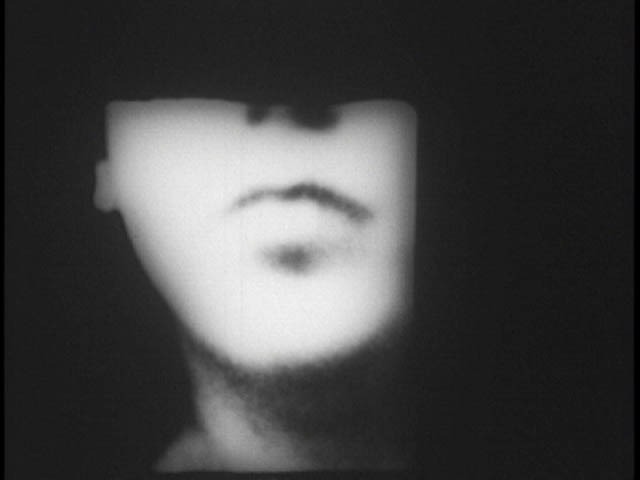
Keeping it Experimental
Written by Kevin McCarthy | Posted by: Anonymous
Filmmaker Maureen Tzudiker is a Scorpio, wore 16mm film pasties in her latest movie (no word on the stock she used), and spoke to NewEnglandFilm.com from her parents’ home in Colorado where her cousin was busy setting something on fire (no one was hurt). But this is only part of the Maureen Tzudiker story: Her three-minute experimental film, "Shimmi," debuts at the Film Fest New Haven on Saturday, September 20th.
"Shimmi" is a three minute-long silent film using the techniques of optical printing, hole-punching, and scratching. Featuring herself as the dancer and subject of the piece, Tzudiker wanted to give the film a "burlesque feel" and a "vintage retro look," so she shot the piece in 16mm black & white. In addition to its screening in New Haven, the short has also been accepted into the Gulf Coast Film Festival in Houston, Texas, and another one in Georgia.
A Colorado native, Tzudiker graduated from the University of Colorado at Boulder, where she studied film under experimental filmmaking godfather, Stan Brakhage. Influenced by the works of Maya Deren, Bruce Conner, Kenneth Anger, and Brakhage, she started the film program at Mass Art in 2002. When she finishes her MFA, she would like to teach and continue "messing" with film. In the meantime, she hopes to shimmy and shake her way to some success at the festivals.
NewEnglandFilm.com talked with Tzudiker to learn more about her particular brand of experimental filmmaking, "Shimmi," and the lengths to which she would go to stay in "film."
KM: What style of filmmaking are you into?
Tzudiker: Experimental. Mostly Stan Brakhage and stuff. I had him as a teacher. Although, at that time, I didn’t really give a crap about school. [Laughs.] Which kind of sucks because now I look back and I’m like, "Oh man!" But I’m catching up, and I really like that kind of work. Like Maya Deren and Harry Smith and all those other innovators.
KM: What types of movies have you made?
Tzudiker: They’re personal documentaries kind of. Well, more like personal documents about emotion and life. I did one about rape. I did one about self-mutilation. I just do things that are very — kind of therapeutic, trying to get it out onto film. So it’s all very personal, very honest.
KM: Is that the kind of work you did at Colorado University, Boulder?
Tzudiker: Yeah, that’s the stuff I did at Boulder. And then I came to Mass Art and I tried to just, you know, keep going in that direction. And I’m still getting there. It’s hard! [Laughs.] But, I like to do really personal [work]. And now my stuff is kind of funny — apparently — so that’s good.
KM: What’s difficult about making films like this? Is it difficult to explore yourself that way?
Tzudiker: Oh yeah. I feel like I have a mental breakdown every semester. [Laughs.] But I mean it’s expected now, so it’s ok. But it totally feels like I have a breakdown sometimes. So — it’s very hard! But it’s like a cleansing experience. Very therapeutic. You get it out. And it’s also difficult because you’re showing yourself to critics, to an audience. That’s also the hardest part: showing it to people in a mass audience. Because you’re like, "Oh! Yep, that’s me. Well … hey guys!" [Laughs.] I tend to be very personable and outgoing with people. And when they see this other side of me they’re like, "Whoa." But that’s how it is so…
KM: What’s the process for you from the time you conceive of an idea to actually finishing it and showing it?
Tzudiker: I tend to go out and shoot alone and shoot different things. I shoot myself a lot. I set up the tripod and do the — what is it? — the run lock button and go in front of the camera and do everyday things and stuff. I kind of think about, what am I dealing with right now? What do I really want to focus on? Film different things that represent it. And go to the optical printer after I develop it — and kind of mess with it. And then, hopefully, fix it in the editing process and it looks good, you know?
KM: How do you "mess" with it with the optical printer?
Tzudiker: Well, it’s a very methodical, meditative process for me to be with this machine in the basement of the school. And going one frame at a time, basically, I slow (the film) down. I distort it. I get close-ups and freeze-frames and do all these different things. And then when I get it back, I’m like, "Whoa, that looks really cool. I didn’t know that was going to happen." So it’s happy mistakes usually.
KM: Was "Shimmi" originally a school project?
Tzudiker: Yeah, it was. I was in Saul Levine’s homemade filmmaking class where we were scratching and painting on film. And doing things like that. And I was like, "Hey I want to use the optical printer, and I’d like to do some scratching and shoot some stuff." And, you know, do a whole mish-mash and blend it all together.
So, actually, part of ("Shimmi") was a big mistake because the optical printer lens wasn’t really [working correctly]. So when I got the film back, I was really pissed… When you see it, it’s cropped so it’s just a corner of it that you can see. And I was so pissed. I was cursing the optical printer and everything. But I was like, "You know what, I’ve got to use it, because cost-effectiveness rules over anything else right now." …So I fit it in, and it works.
KM: What can you tell me about "Shimmi?"
Tzudiker: Oh, it’s — I don’t know. I just did a film about sexual assault, and I was really wanting to do more of a free, funny dancing film. And I wanted to shoot from my neck down and do some interesting things with the camera. I made a lot of handmade, um, pasties. I would cut little circles out of film and put them over my nipples. Like each one.
KM: Sure. Who doesn’t have celluloid pasties? I’ve got three or four sets.
Tzudiker: Awesome… It was kind of fun.
KM: So, you still haven’t really told me — what is "Shimmi" about?
Tzudiker: Oh! [Laughs.] It’s a dancing film. Do you know Bruce Conner’s stuff?
KM: I’m not familiar with him, no.
Tzudiker: He did a lot of fast cutting, MTV-before-MTV dancing films. He did this one called ("Breakaway")… It had very fast cutting and it had this dancer — actually it was Tony Basil who ended up being in it. And it really affected me. I really liked it. I was like, "Wow, this is really kind of contemporary for the 1960s."
So I wanted to make a dancing piece, but silent — yet have its own rhythm through the editing.
KM: How long did it take to shoot "Shimmi" from start to finish?
Tzudiker: Well, I was under a pretty tight deadline because the teacher from my studio was very much about "Get it done, get it done." And she was right. I needed to get it done. But with film I was editing on the Steenbeck, and I was putting in so many hours. I was like, "I’m working as hard as I can — and I’m not getting this done." It took me a good three months… and that was working all the time on it. And that’s nothing because most good films take seven years, right? [Laughs.]
KM: How did you get your film into Film Fest New Haven?
Tzudiker: [Laughs.] I have no-fucking-clue, man. I don’t know. I sent that and another video I did — I sent those out to 15 different festivals. And I was just like, "Fuck it. Whatever. Reject me. C’mon, reject me!" I sent a film I did as an undergrad out to a lot of festivals, and I kept all of the rejection letters. And I did get into some festivals too, so that built my confidence, and I was like, "Oh, all right, so we’ll try it again," you know? And I think it’s also important for exposure. Because you wouldn’t be calling me unless you knew I was in it, right?
KM: Hell no! I was reluctant to call you even though I knew you were in it!
Tzudiker: Oh man.
KM: Do you have a more traditional narrative kind of story — documentary or fictional — in you?
Tzudiker: No. I don’t. [Laughs.] I don’t have it in me. But I do enjoy working on other people’s that are traditional. If I did, I’d find a way to definitely mess with it because I really don’t like convention. And I’m really sick of seeing it, so it’s nice when I see something totally inventive and original. I’m always trying to go for that.
KM: What do you want to do down the line? I know you want to stay in film, but do you have any particular career aspirations?
Tzudiker: I’d like to teach. All my friends are moving to Chicago, so I was thinking, "Hey, why not go to Chicago?" I’d like to teach film. I’d like to make films. Anything that has to do with film. Developing it. Working in a really shitty optical house. It doesn’t matter. As long as there’s some kind of film. Getting a Latte for a guy with a film camera. Yeah. Anything related to the film area.
KM: Cleaning the film off of a pond would be OK?
Tzudiker: Exactly.
Maureen Tzudiker’s film 'Shimmi' screens at the Film Fest New Haven (www.filmfest.org) on September 20th.











